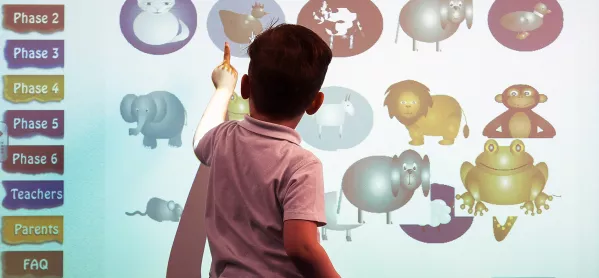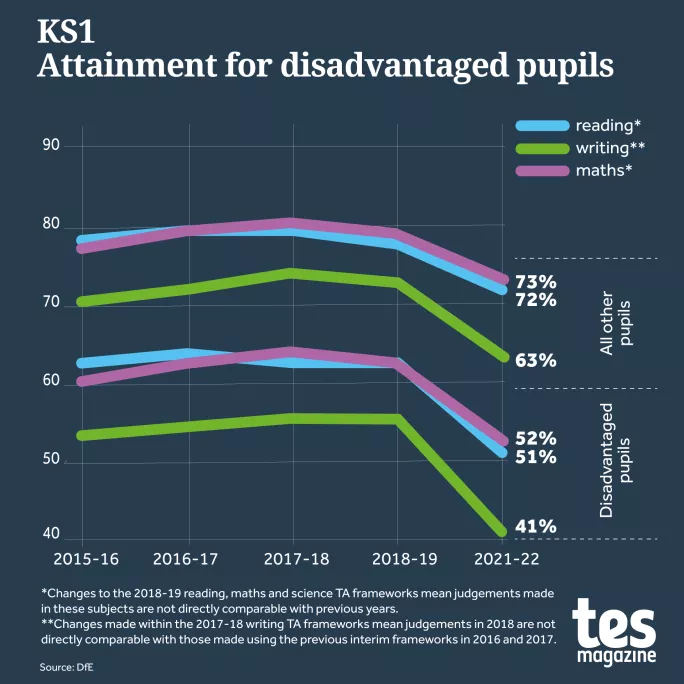There is no question that the key stage 1 and phonics results are not as good as we would want. But after more than two years of disrupted education, they are entirely understandable.
Covid disproportionately affected younger children who had a higher percentage of their time at school lost than any other year group.
Children who were just starting out at school had their education significantly disrupted, and this, combined with the fact that trying to teach younger children remotely posed more challenges, gives much needed context to the results.
As was the case in other key stages, it was children from the most deprived backgrounds who were most hindered by the pandemic.
While the proportion of non-disadvantaged pupils meeting the expected standard in phonics fell from 84 per cent in 2019 to 80 per cent this year, for disadvantaged pupils this dropped from 71 per cent to 62 per cent.
A similar trend can be seen for the KS1 assessments in reading, writing and maths.
Tutoring efforts
Schools are fully aware of which of their children might be struggling and are hard at work to plug the gaps in their knowledge.
The National Tutoring Programme will prove hugely helpful here as an additional source of support, and I am sure that we will see more interventions arise over the coming years.
One real source of optimism for me is how much time we have left with these children who are right at the start of their time at school. That’s why I’m confident that this cohort will bounce back from this dip in results.
I don’t expect these children to have the same decline from previous years when they take their key stage 2 Sats, GCSEs or A levels.
Similarly, I would expect to see better results at this stage next year, as we will hopefully have had another uninterrupted year with our Year 1 pupils to help mitigate any lingering effects of the pandemic.
Tackling attendance
However, one challenge to this is that attendance is still an issue across the country, with too many children not coming to school on a regular basis.
At REAch2, our attendance figures have improved on the past academic year, but they are still not where they were before Covid hit.
There are myriad complex reasons behind this, but all educators know we need children in school if we are to help them.
There’s no question that community outreach will be key to this. Like schools across the country, we have opened our doors to those around us with initiatives like Warm Rooms, where the heating is always on and tea and coffee are available for those who want it, community fridges offering food and produce to those who could use it, or “shops” providing food, clothing, books and toys, free of charge, with no stigma or judgement.
These will be vital in developing stronger links with our local communities, and, fingers crossed, help encourage parents and pupils to come to school if they might otherwise have been unwilling.
Encouraging new teachers to the right areas
But having brought these children back into school, we need to make sure that every moment they spend in front of a teacher is as valuable as possible. I am optimistic that the reforms to initial teacher training (ITT) will help in this regard.
All ITT providers will deliver high-quality training, leading to expert teachers joining schools and making a real impact from their first day.
However, the reformed ITT will take time to bear fruit and, unfortunately, there is still a shortage of teachers in some areas with schools really struggling to recruit.
This is an area where government support could well be effective, introducing various incentives to encourage the best teachers to move to where they are most needed.
If we can place the best teachers in front of children who have suffered the most, then we have a very real chance of mitigating the damage of the last few years. This won’t happen by magic - it will take a tremendous amount of hard work from a sector that has already given so much.
But I know the work will pay off and will mean that this year’s results won’t be reflected in these children’s future achievements.
That’s what we have to work towards.
Cathie Paine is the CEO of REAch2 Academy Trust






